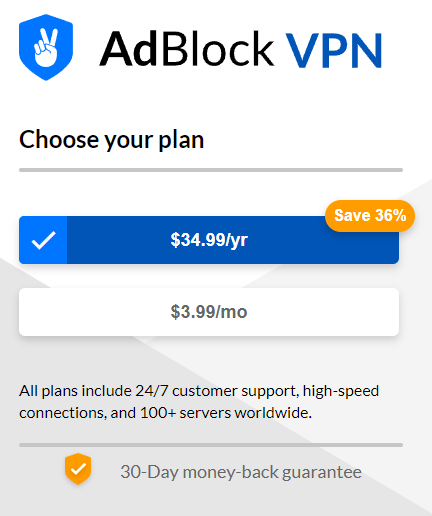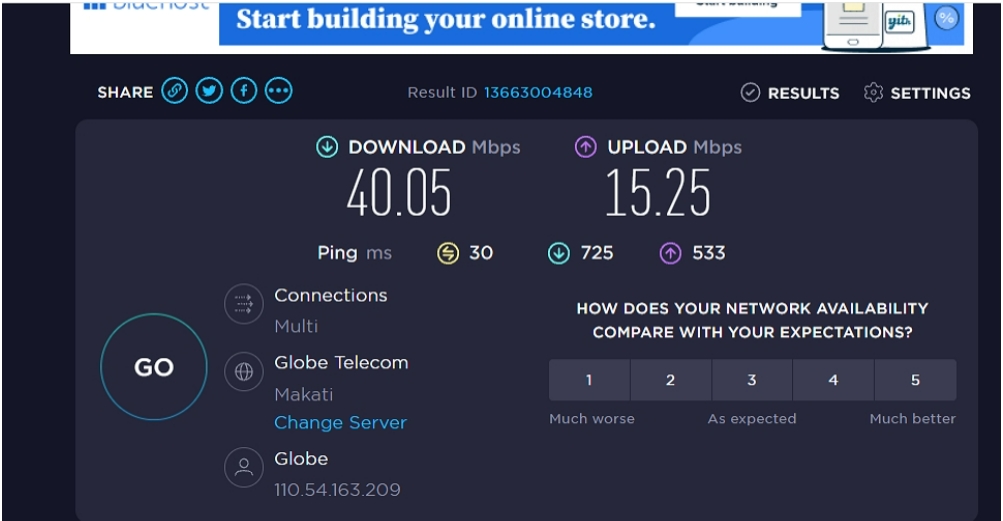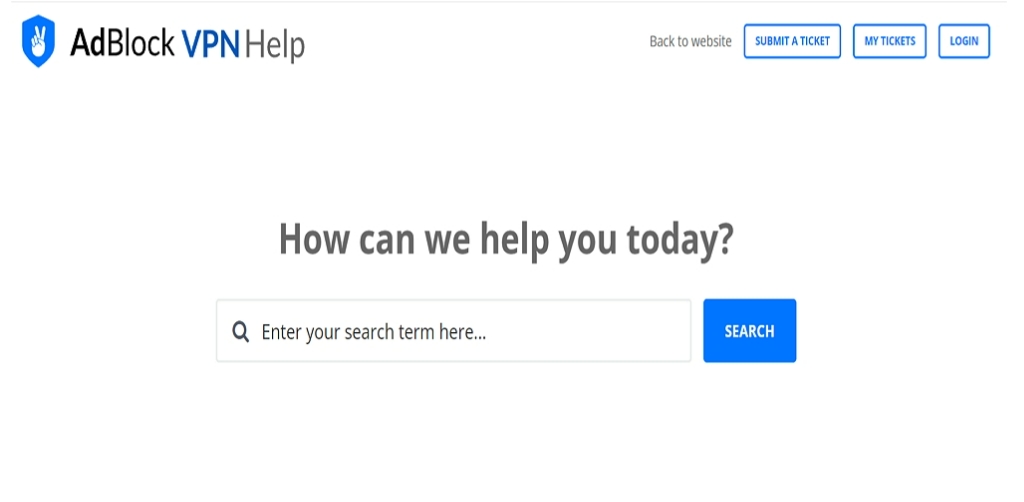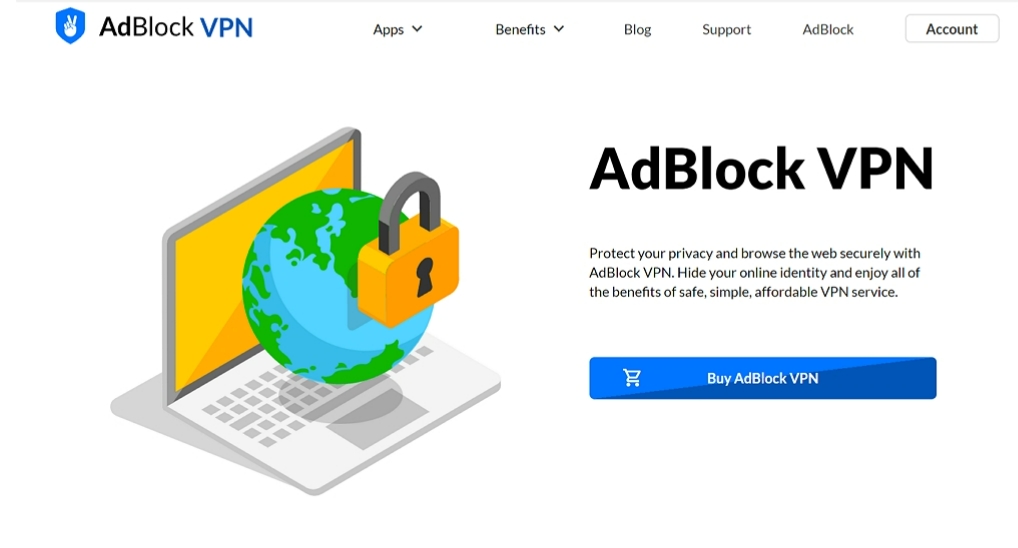TechRadar Verdict
AdBlock VPN is a mixed bag. Subscription prices won't break the bank and its apps are easy to use, but it's hard to ignore the lack of essential VPN features. Without a kill switch, split tunneling option, and decent content unblocking, AdBlock VPN isn't a tempting option right now.
Pros
- +
Decent prices
- +
Open source apps
- +
Smooth user experience
Cons
- -
Lacks vital features
- -
Struggles to unblock streaming content
- -
Doesn’t support more platforms than the bare minimum
- -
Small server network
- -
No WireGuard protocol
Why you can trust TechRadar
1. About AdBlock
2. Pricing
3. Privacy
4. Performance
5. Streaming
6. Torrenting
7. China VPN
8. Compatibility
9. Customer support
10. Alternatives
11. Conclusion
Ad blockers are an absolute necessity these days—particularly when you consider how the internet has become increasingly monetized. One of the more well-known ad blockers is AdBlock, and the service's longevity has won it something of a cult following.
AdBlock recently made its move into the highly competitive VPN market with a VPN of its own: AdBlock VPN. It's a bold play, to say the least, because today's best VPNs are polished, battled-tested, and uber-reliable.
So, how does AdBlock VPN stack up? I've put AdBlock VPN through its paces, and I'll run you through the provider's speed, security tools, features, and overall value for money, so you can decide for yourself whether it's worth investing in.
AdBlock: about the company
AdBlock VPN is owned by its parent company, and namesake, AdBlock. Founded in 2009, the original product is the ad-blocking browser extension that, as you'd expect, removes ads, trackers, and malware from Google Chrome sessions. Since then, AdBlock has expanded its services from a singular extension to a full-fledged VPN service, with the help of a small but dedicated team of developers.
The company makes its home in San Francisco, California, which isn't ideal from a privacy standpoint. The United States is one of the original members of the Five Eyes intelligence sharing pact, after all, and without a robust no-logs policy, your data could end up in the hands of the US government if AdBlock VPN is ever served with a warrant.
AdBlock VPN pricing
AdBlock VPN offers two plans: monthly and annual. They're identical in every way with the only difference being the overall duration of your subscription and, of course, the price.
AdBlock VPN’s monthly plan costs $3.99 per month while the annual plan costs $34.99 per year. That works out to a monthly saving of about $2.9 which isn't a bad VPN deal at all. Both AdBlock VPN plans support 6 devices per account.
Unfortunately, there's no free trial to speak of. You can make good use of the 30-day money-back guarantee, however, that'll let you try AdBlock VPN in your own time and claim your money back if you're not happy.
The service currently only accepts two payment methods: PayPal or credit card. I think that this rather stingy buffet of options (and especially the lack of cryptocurrency choices) is a significant detriment to the service. I hope that AdBlock VPN will expand its payment options in the future.

Does AdBlock VPN protect your privacy?
AdBlock VPN’s encryption is up to current industry standards. The service uses the AES 256-bit encryption protocol, which is one of the most widely used and robust encryption protocols available.
I'm also happy to say that AdBlock VPN performed well during my leak tests. So, you can rest assured that you aren't in danger of leaving an identifiable trail across the web as you go about your browsing.
Unfortunately, this is where the good news ends. I didn't uncover anything seriously shady about AdBlock VPN's privacy measures, but the lack of tools is disappointing.
Let's start with the VPN protocols. No version of AdBlock VPN lets you configure your protocol at any point, which is something you'd expect from a VPN today. AdBlock also uses OpenVPN with its Windows, Mac, and Android apps, and IPSec on the iOS platform. These are two of the older protocols available—and there's no WireGuard compatibility. WireGuard combines the strength of OpenVPN and IPSec, making it an ideal blend of security and speed, and not including it is a major flaw.
You won't find any split tunneling functionality, either, which allows you to determine which apps and programs use the VPN connection and which don't. It's a handy way to get around VPN bans and, as a result, the fact that it's missing is another blow to AdBlock VPN. Likewise, I was surprised to see that there's no kill switch. These are must-have VPN features, seeing as they'll cut your internet connection the moment your VPN drops out, and prevent data leaks.
I also checked out the AdBlock VPN ad-blocking functionality. It was decent, but not as good as dedicated ad blockers like uBlock Origin or AdBlock Plus.
AdBlock VPN's logging policy
AdBlock VPN makes big promises on its website, claiming to stick to a zero-logs policy, and I did some digging to find out whether the company is making good on its promise.
Long story short; it is. The AdBlock VPN privacy policy confirms as much, stating that the service only keeps diagnostic data and bandwidth usage, and not anything else. That's a great sign.
However, being a relatively small service, it appears that AdBlock VPN hasn't undertaken a third-party audit of its logging policy. This is something I hope changes in the near future, seeing as there's no better (or more transparent) indication of a VPN's commitment to user security.
Speed testing: How fast is AdBlock VPN?
Whether you plan to use AdBlock VPN for streaming, gaming, torrenting, or checking out social media, speed is going to be a top concern—and I put the VPN's performance to the test.
There's no way to choose a preferred protocol, unfortunately, so I conducted my experiments using the default configuration on the Windows version. All of my tests used a 100 Mbps connection over Ookla.
Firstly, I tested the UK server location, which gave me a great showing. It clocked in at about 87.62 Mbps download and 13.54 upload. Considering the original connection, this is a superb result.
As I checked out servers further away from my UK home base, however, I noticed dips in the connection quality. The German server recorded a result of 62.91 Mbps download and 8.4 Mbps upload. The extra distance means that this drop isn't a massive surprise and, overall, I'd consider the results pretty normal.
The last step of my speed testing involved connecting to a US server location. I received a result of about 53.52 Mbps download and 6.9 Mbps upload. That's pretty good for a server that's half a world away from me.
All in all, I'd say that the speeds I recorded will be more than enough to keep most people happy as they go about their usual online business, including watching 4K content. Although, since AdBlock VPN isn't a great pick for streaming (more on this in a moment), I'd advise you to look elsewhere if you're a big fan of Netflix, BBC iPlayer, or Amazon Prime.

Can AdBlock VPN unblock streaming sites?
Suffice it to say, AdBlock VPN's unblocking powers did not blow me away. I wasn't able to unblock any of the international streaming platforms I tried, including Netflix, Disney+, Hulu, and BBC iPlayer.
Worse still, these sites detected VPN usage pretty quickly, which is the last thing you want when you're trying to tune in to your favorite series. I couldn't check out international content on Netflix and Hulu, Disney+ denied my access outright, and videos on BBC iPlayer just wouldn't play, claiming I was in the wrong region.
AdBlock gets a failing grade when it comes to streaming and unblocking. If you're after a reliable streaming VPN, you're in luck—there are some seriously slick alternatives out there. I recommend ExpressVPN to VPN veterans and newbies alike, seeing as it's incredibly easy to get set up, and you'll have no trouble unblocking big streaming giants, smaller local services, and HD video content.
It's also worth noting that AdBlock VPN doesn't have the most expansive server network—which is another reason you'll want to look elsewhere for a stellar Netflix VPN. Currently, the VPN offers servers in 38 locations, though the exact number is kept under lock and key, and AdBlock VPN itself says that there are more than 100 servers to choose from. This isn't a lot, especially when you look at NordVPN and Private Internet Access (PIA). There isn’t a direct correlation between server numbers and connection quality, but it never hurts to have more.
Does AdBlock VPN support torrents?
AdBlock VPN is pretty discreet about it, but does bill itself as a torrenting VPN, supporting P2P traffic across all of its servers. I decided to put this to the test and, I'm pleased to say, that the VPN lived up to expectations.
I downloaded a handful of files using the BitTorrent protocol. AdBlock VPN worked well, and my downloads completed without any issues.
Is AdBlock VPN a reliable China VPN?
Head on over to the AdBlock VPN site and you'll see that it promises access to "any website or app without censorship or restrictions". This sounds great, on the surface, but can it breach the infamous Great Firewall of China?
To find out, I connected to a server in mainland China, and then tried accessing popular websites that are typically blocked in the country. Think Google, Facebook, and YouTube. Unfortunately, I wasn't able to check out any of these sites while connected to an AdBlock VPN server.
AdBlock VPN's site does somewhat account for this, though, stating that the VPN may encounter problems in regions with embargos and regions with high internet censorship such as Cuba, Iran, and China. This essentially takes the service out of the running when it comes to the best VPNs for China—and I'd stick to ExpressVPN if you want to bypass those blocks and geo-restrictions.

Which platforms is AdBlock VPN compatible with?
AdBlock VPN provides the bare minimum when it comes to platform compatibility. You'll be able to install the app on four platforms; Windows, Mac, Android, and iOS. There's no manual configuration available and, at the moment, the VPN is only accessible through its own app.
I would like to highlight the lack of platforms here, as not only does Adblock VPN not support any routers whatsoever, but it also doesn’t work with Fire Stick TVs or Linux devices. This is a disappointing pitfall for an aspiring VPN.
Luckily, the installation process itself is nice and straightforward. All you need to do is download the app from whichever app store your device supports, or from the AdBlock VPN site, and follow along with the installation wizard. You won't need to create an account, either, and you can log in with the same email you use for payment, at which point you will receive a password in that email address that you then use to log in.
What customer support does AdBlock VPN offer?
AdBlock VPN does offer 24/7 support, and you can reach out via the support ticket system on the site or email the team directly. I tried both of these options and recieved an answer withint 24 hours, both times. AdBlock VPN's responses were relatively professional and answered my questions without any hiccups.
The one thing missing from AdBlock VPN's customer service is live chat. The current system works fine, don't get me wrong, but when most of today's top VPNs offer instant support, it's a little frustrating to have to jump through extra hoops. Hopefully, AdBlock VPN includes the feature sometime in the future.
However, I was pleased to see a detailed FAQ section on the site. This comes in handy if there's specific information you're trying to hunt down and don't want to wait for a response from a support specialist.
Are there alternatives to AdBlock VPN?
Given all the pitfalls and downsides, it's hard to recommend AdBlock VPN. Below, I've listed a handful of alternatives with more features, bigger server networks, and the reliability you need for P2P file sharing and streaming.
NordVPN is my #1 pick overall with a whopping 6,300+ servers to choose from. That means you'll have no problem unblocking content and sites from around the world—and NordVPN is the fastest VPN I've tested in a long time, too.
ExpressVPN is an awesome pick for newbies, thanks to its sleek apps for just about every platform you can imagine. It boasts a good mix of features and security, and also works in China, unlike AdBlock VPN. What's more, ExpressVPN has its very own WireGuard-based protocol, Lightway.
Surfshark proves that cheap VPNs can still be stuffed with features. I particularly like that the VPN offers up unlimited simultaneous connections, which is great value for money and means you can protect all of the devices in your home with a single subscription. Surfshark has built-in ad-blocking and malware protection, ensuring a smooth and safe browsing experience.
CyberGhost has been around for a long time, now, and comes with a built-in ad blocker that's more effective than AdBlock VPN's version. CyberGhost also offers dedicated servers for streaming, allowing you to bypass geo-restrictions and access popular platforms like Netflix, Hulu, and BBC iPlayer.
AdBlock VPN review - final verdict
AdBlock VPN is a small fish in a big pond. The apps are easy to use and the price points are fair, but there's a distinct lack of features (and servers) that mean it's not a competitive choice. Not having quality-of-life features, like a kill switch and split tunneling, no WireGuard protocol, and a dismal content unblocking performance are glaring downsides. Plus, AdBlock VPN itself admits that the service probably doesn't work in China.
The customer support, while it lacks a live chat option, is decent, and provides solid answers within reasonable timeframes. I'd like to see AdBlock VPN introduce a free trial, however, to give users an easy, fuss-free way to check out the service. As it stands, you'll have to make do with a 30-day money-back guarantee.
We test and review VPN services in the context of legal recreational uses. For example:
1. Accessing a service from another country (subject to the terms and conditions of that service).
2. Protecting your online security and strengthening your online privacy when abroad.
We do not support or condone the illegal or malicious use of VPN services. Consuming pirated content that is paid-for is neither endorsed nor approved by Future Publishing.

Sam Dawson is a cybersecurity expert who has over four years of experience reviewing security-related software products. He focuses his writing on VPNs and security, previously writing for ProPrivacy before freelancing for Future PLC's brands, including TechRadar. Between running a penetration testing company and finishing a PhD focusing on speculative execution attacks at the University of Kent, he still somehow finds the time to keep an eye on how technology is impacting current affairs.
